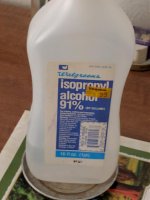morgothaod
Member
The instructions with my binocs said I should use the cleaning cloth that came with it as well as isopropyl alcohol. Is that safe? This is what I have at home. Do you recommend a special cleaner or cleaning kit? How often should I clean my binocs (Can I do damage if I clean them too much)? Also, is this good instructions? https://www.youtube.com/watch?v=z5DaExac1e0
For storing, should I just put my binocs in my case with the lens covers? Do the binocs need to be standing up or laying down?
For storing, should I just put my binocs in my case with the lens covers? Do the binocs need to be standing up or laying down?






